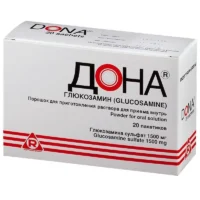Description
Alendon-10 (Alendronate Sodium) Tablets 10 mg. №30
Composition
Active ingredient: Alendronate sodium
Other ingredients: Lactose monohydrate, microcrystalline cellulose, croscarmellose sodium, and magnesium stearate.
Mechanism of Action
Alendronate sodium, a bisphosphonate, inhibits bone resorption by osteoclasts, thereby promoting bone mineral density and reducing the risk of fractures in osteoporotic patients.
Pharmacological Properties
Alendronate sodium acts on bone tissue, specifically targeting areas of high bone turnover. It binds to hydroxyapatite crystals in bone and inhibits osteoclast activity, leading to decreased bone resorption.
Indications for Use
Indicated for: Treatment and prevention of osteoporosis in postmenopausal women to reduce the risk of fractures, including vertebral and nonvertebral fractures.
Contraindications
Do not use if: Hypersensitive to alendronate sodium, unable to stand or sit upright for at least 30 minutes, have esophageal abnormalities, or have difficulty swallowing.
Side Effects
- Common side effects may include abdominal pain, acid regurgitation, and constipation.
- Rare but serious side effects include osteonecrosis of the jaw and atypical femur fractures.
Usage Instructions
Dosage: The usual dose is one 10 mg tablet taken orally, once daily, on an empty stomach with a full glass of water. Patients should not lie down for at least 30 minutes after administration.
Benefits Compared to Analogues
Alendon-10 has demonstrated superior efficacy in increasing bone mineral density and reducing fracture risk compared to other osteoporosis treatments.
Suitable Patient Groups
Alendon-10 is suitable for postmenopausal women with osteoporosis. It is not recommended for use in children, adolescents, or pregnant women.
Storage and Shelf Life
Storage: Store at room temperature, away from moisture and heat, in the original packaging to protect from light.
Packaging Description
Alendon-10 tablets are packaged in blister packs of 30 tablets each, ensuring convenient and accurate dosing for patients.
Clinical Evidence and Proven Effectiveness
Alendronate sodium has been extensively studied for its efficacy in osteoporosis treatment. Research published in the Journal of Bone and Mineral Research demonstrated that long-term alendronate treatment significantly reduces the incidence of vertebral and nonvertebral fractures compared to placebo over a 10-year period.





